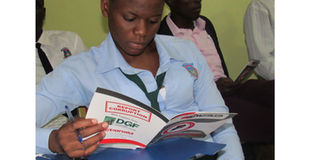How young people are embracing anti-corruption clubs

Sunday Faith Onyutha, a student of Uringi SSS in Nebbi District reads a booklet that contains testimonies of students who joined anti-corruption clubs in various schools.
“I wish the approach of raising the conscious of young people against corruption in secondary schools should be replicated in primary schools. It is a wonderful idea that will groom transparency among the future generation,” says Mr Gabriel Jalobo, the Nebbi District Education officer.
Mr Jalobo says, young people are the agents of change and if they grow up with the attitude of valuing accountability, they will effectively challenge corruption wherever it is.
Speaking at a debating competition that was themed on the struggle against corruption, which attracted schools from Pakwach and Nebbi districts, Mr Jalobo said one of the reasons why most adults have no will to expose corruption is because they were not nurtured to value transparency and accountability at an early age.
“I believe the national curriculum should also be designed to teach children right from primary schools that corruption is costly to society, they will grow up knowing its vices and shun it,” he said.
In Nebbi town, students from Excel College Pakwach, Pakwach Secondary School, Angal Secondary School and Uring Secondary School formed anti-corruption clubs after a debating competition.
Mr Norman Tumuhimbise, an anti-corruption crusader and trainer said the task before young people, who make up over 75 percent of Uganda’s population, is to rise and confront the vice because if it’s not uprooted, they will face its consequences.
“Until you fight corruption, Uganda cannot go anywhere as far as prosperity is concerned,” Mr Tumuhimbise said. “If you keep quiet about things that matter, we shall go nowhere as a country. You are not too small or young to do something. Use these clubs to spread the gospel at home, school and community.”
The students resolved to spread the gospel by appointing anti-corruption class ambassadors, organising inter-class and school anti-corruption debates, write articles against corruption, compose anti-corruption songs and drama, petition public officials and leaders on issues like shoddy work, lack of drugs in health centres, among other sustainable action points.
The debates are part of Action Aid Uganda’s effort to promote accountability and fight for social justice.
The organisation, under the I Paid A Bribe platform, encourages citizens to report corruption, according to Mr Phillip Kabuye, the officer in charge of the project that has been used to mobilise young people, mainly those at school to become conscious about the impact of corruption.
He said Action Aid Uganda guides the students on how to create the clubs through their teachers who act as club patrons, and leave them to manage and sustain them.
“These clubs are used to raise the students’ consciousness to appreciate that public resources like taxes do not belong to civil servants or contractors. They will also grow up knowing how to demand accountability from those holding public offices,” he said.
According to Mr Kabuye, the clubs are intended to uphold the culture of integrity, transparency and accountability among young people at an early age before joining the public and private sector in their future careers.

Mr Gabriel Jalobo, the Nebbi District Education officer, said the lower primary curriculum should be modified to introduced subjects that expose learners to integrity and accountability
In Masindi District, students from St Cyprian SSS, Strive SSS and Kiziranfunzi SS, Masindi SSS, Modern Pride SSS, shared experiences on how they have kept the fire of anti-corruption clubs burning in their schools.
They testified how some school administrators who were not comfortable with the clubs, are now receptive
Apart from engaging public leaders on issues of accountability and value for money, the students demand accountability from their teachers because charity begins at home.
One student from a Masindi-based school narrated how a games teacher, who had pocketed money that was meant for sports trophies and awards, was forced to surrender the cash after members of the anti-corruption club reported him to the school managers.
“The most effective in the fight against corruption is by reporting it. If you don’t report corruption, you are doing nothing. The perpetuators of corruption have to know that they are being watched and about to be exposed, Mr Tumuhimbise said in Masindi.

Members of anti-corruption clubs from Pakwach and Nebbi secondary schools with their clubs patrons, anti-corruption activists and other officials




